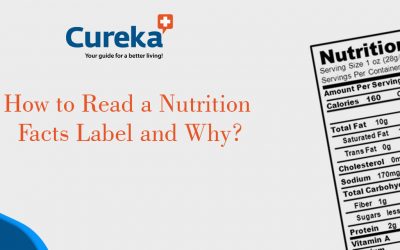Living with Liver Disorders? Here’s How a Tailored Protein Supplement Can Help You Feel Stronger
Medically Reviewed By:
Dr. Hema Sathish M.B.B.S., D.D(UK)
Dermatologist, Founder of Cureka
Living a healthy life is hard in this world, but it’s even more challenging with liver disease. The liver contributes a crucial role in detoxifying the body, making vital proteins, and supporting metabolism. When liver function is compromised, individuals may find it difficult to absorb essential nutrients, leading to muscle deterioration, reduced strength, and overall weakness. The solution that is effective to help those living with liver disease is tailored protein supplements. But how does protein help, and why is it so vital for liver health?
The Significance of Protein for Liver Wellness
Our body’s muscles, tissue, and enzymes are made up of protein. If an individual is fighting with liver disorders, it is necessary to take adequate protein. Protein-energy malnutrition, a condition where the body lacks necessary nutrients to maintain muscle mass and nutrients, often occurs if the body already has liver disease. Ensuring the body gets the required protein is one of the key aspects of managing liver disease because it helps to repair the damaged tissues, support immune function, and improve overall strength.
Regarding protein intake for liver health, one should concentrate on premium sources of it. The protein supplement that we choose makes a difference. From whey protein to Protein drinks meant for liver health, these products can give the essential amino acids that an individual lacks during poor dietary intake or malabsorption issues.
Protein Supplements for Liver Health
To fight against liver disease, protein supplements would be a great choice. These supplements are crafted with the correct balance of proteins, vitamins, and minerals, which are easier to digest and absorb. The tailored supplements are made to be gentle on the liver, reducing the burden of processing the overall nutritional absorption. But the regular protein products are not specifically designed for this purpose.
Taking the protein supplement in daily life can provide the required support for resistance against liver disease. For example, whey protein powder is the premium source of high-quality protein that can be easily absorbed and provides the body with the required amino acids. It helps to prevent muscle wasting, improve muscle recovery, and boost overall vitality. Protein drinks are a great alternative for those who are unable to eat whole foods or have a limited appetite due to their condition. There are also additional options like hepatic supplements that are designed to support liver health and Hepasure granules that contain amino acids, which protect our liver health.
Are BCAAs safe for the liver?
When taken in the prescribed levels, branched-chain amino acids, or BCAAs, are generally safe for the liver. By increasing muscle mass and lowering side effects such as hepatic encephalopathy, BCAAs may benefit patients with liver cirrhosis. In fact, under some circumstances, they might even promote liver health. According to certain research, BCAAs may help avoid fatty liver disease.
Moderate BCAA supplementation is safe for the liver in healthy people. Before taking BCAAs, it is better to consult with the doctor.
Nutrition for Liver Illness: Key Considerations
One of the most crucial aspects of liver disease management is nutrition for liver disease. People who follow a well-balanced diet may find it easier to handle the condition’s mental and physical burden. Not only the protein, but also other nutrients like vitamins A, D, E, and K, as well as minerals like zinc and magnesium, contribute a major role in liver wellness.
High-protein, low-calorie food consumption is so important in liver problems. The reason is muscle loss; it is the major concern while facing liver-related problems. Especially in liver disorders, cirrhosis, hepatitis, and fatty liver disease can significantly lower the body’s ability to consume and utilize nutrients, making it tough to improve a healthy weight and muscle mass. This is where high-protein low-calorie foods play a key role in providing necessary proteins with minimal calorie intake, which can prevent further burden on the liver and promote proper health management.
Lean meats like chicken breast and fish, as well as tofu and eggs, are examples of foods that are high in protein and low in calories. But the problem is these foods are not easy to consume every day; instead of these, protein supplements come in handy, giving an efficient way to get daily protein requirements.
Ways Protein Supplements Can Improve Your Life Quality
Protein is essential for improving general health, particularly for people with liver diseases. By incorporating a tailored protein supplement into your diet, you can get a range of benefits that may relieve the symptoms and difficulties of liver disease.
Here’s how:
Preventing Muscle Wasting: Cachexia, or muscle loss, is one of the most prevalent signs of liver illness. Whey protein powder helps to preserve muscle mass by providing a constant supply of amino acids. This is crucial to develop and maintain the strength, endurance, and overall function
Enhancing Immune Function:
Our body’s immune function depends on the liver, but liver disorders frequently compromise this vital function. For the production of antibodies and immune cells, protein is an essential thing that can help the body to resist infections. By adding the protein drinks into your diet, you can provide the immune system with the support it needs.
Boosting energy levels: Liver disease can make you feel fatigued and weak. When your body has difficulty absorbing nutrients from regular food, protein supplements are an efficient way to provide sustained energy throughout the day. It can allow you to feel more energetic and engaged all day.
Improved Digestion and Nutrient Absorption:
Protein drinks and powders are easier for the body to absorb than full foods, which may be more difficult to digest. Because it decreases the pressure on the digestive system and ensures that the body receives the most benefit from the protein taken, this is especially beneficial in the scenario of impaired liver function.
Incorporating protein supplements into your diet
It’s crucial to speak with a healthcare professional or dietitian when selecting a protein supplement to find the one that best suits your requirements. You may be recommended to use whey protein powder or other tailored liver disease supplements which are specifically formulated to support liver function.
Not only protein, you should also focus on a balanced diet that includes high-protein, low-calorie foods, healthy fats, and whole grains. This all-encompassing strategy will help you stay strong, support your liver, and enhance your general health.
Conclusion
When battling with liver disorders, you need proper management of nutrition and lifestyle. By taking tailored protein supplements into your daily routine, you can significantly develop your strength, prevent muscle mass loss, and boost your quality of life. Whether it’s whey protein powder, protein drinks, or other liver-friendly liver disease supplements, these can offer the required support in managing liver conditions and promoting overall health.
To make sure that your diet is optimized for liver wellness, talk to your healthcare advisor and concentrate on a well-balanced diet that includes meals of high-protein, low-calorie foods. You may experience increased strength, heightened energy levels, and a greater ability to confront the difficulties associated with living with liver disease.
FAQ’s
1. How can protein supplements help with liver disorders?
Protein supplements can help individuals with liver disorders by providing essential amino acids that support muscle recovery and growth, which is often compromised due to liver-related issues. They also aid in maintaining protein balance, which is crucial for the proper functioning of the body, especially in cases of liver disease.
2. Are protein supplements safe for people with liver diseases?
Yes, protein supplements can be safe for individuals with liver diseases when taken under the guidance of a healthcare provider. It is important to select high-quality, easily digestible protein supplements that cater to the specific needs of individuals with liver conditions, ensuring they do not exacerbate any existing symptoms.
3. What types of protein are recommended for people with liver disorders?
For individuals with liver disorders, easily digestible proteins such as whey protein isolate, plant-based proteins, and hydrolyzed protein are often recommended. These types of proteins are gentler on the liver and help in better absorption without overloading the digestive system.
4. How much protein should I consume if I have a liver disorder?
The amount of protein required for individuals with liver disorders varies based on their specific condition and needs. It’s important to consult a healthcare professional to determine the appropriate protein intake. Generally, moderate amounts of protein spread throughout the day are recommended for optimal absorption and use by the body.
5. Can protein supplements improve my strength and muscle mass with liver disease?
Yes, tailored protein supplements can help improve muscle strength and mass, which are often diminished in individuals with liver disorders due to malnutrition or poor protein absorption. By supplementing with protein, individuals can maintain or regain muscle mass, aiding in overall recovery and strength.
Reference:
- The immune niche of the liver – Oct 2021 – https://pubmed.ncbi.nlm.nih.gov/34709406/
- Does whey protein supplementation during resistance exercise have additional benefits for decreasing hepatic fat content? – Dec 2023 – https://pubmed.ncbi.nlm.nih.gov/37245070/
- Energy and protein requirements of patients with chronic liver disease – Jul 1997-
https://www.sciencedirect.com/science/article/abs/pii/S016882789780308X











